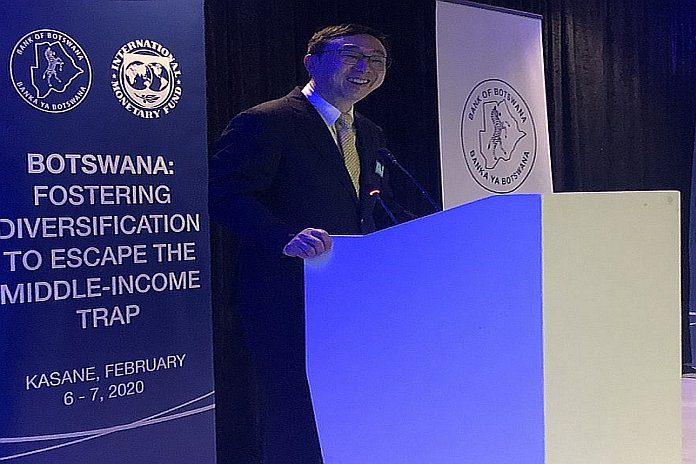By Deputy Managing Director Tao Zhang in Kasane, Botswana
It is my pleasure to welcome you to this workshop to discuss the various ways to foster diversification. This is my second visit to Botswana. In 2018, unfortunately, time precluded us from discovering this beautiful country more thoroughly. This time, thanks to the authorities, we have the great opportunity of not only seeing more but also learning and engaging with key participants at this workshop in Kasane. I am very grateful to the Governor for this opportunity.
During my last visit, I underscored the success story of Botswana—one of the inspiring transformations in Sub-Saharan Africa. That still remains the case. However, I also emphasized the need for a new growth model for Botswana to accelerate its convergence and transition to high-income status. At the same time, in the short term, the country has to guard against external shocks—those to the diamond market and climate change. These short- and long-term goals could be addressed by diversifying the economy.
Prior to coming here, I had the privilege of discussing these issues with His Excellency President Masisi. I can assure you that we are on the same page. The political will is strong and this is perhaps one of the most important factors for the success of any strategy.
We also agreed that this workshop is timely as the authorities are polishing their strategy and reassessing the growth policies currently in place.
It is also timely for our work at the International Monetary Fund (IMF). Our October 2020 edition of the Regional Economic Outlook for the Sub-Saharan African region will examine export diversification in the region. I can also tell you that we have experienced increasing demand from our member countries to deepen our work on issues like how to achieve diversification including export diversification.
The government of Botswana has made clear its objectives. The question that remains is how best to achieve them. If the answer to that question was straightforward, we would not be here in this room. So, please let me articulate what we in the Fund believe are the key questions that decision-makers in Botswana and other countries need to answer. It would be remiss of me if I didn’t mention what everyone in this room knows—namely, macroeconomic stability and a predictable policy environment are critical to supporting good outcomes from the interventions we discuss below:
First: What is the role of the government? Should it follow sector-neutral or horizontal policies, letting market forces choose sectors and activities, or should it follow a more active approach as many countries have done? There is, for example, an ongoing debate on whether Chile followed the standard growth recipe or went beyond it in developing the salmon industry. I believe we may learn more on this point after listening to my friend and former colleague, Pablo Garcia, a board member of the Central Bank of Chile, as well as other distinguished speakers.
Of course, Western textbooks, like Keynes’ General Theory, say that markets do indeed fail and government intervention could be warranted. But, in practice, identifying a market failure could prove more difficult than it is on paper.
Even abstracting from market failures, some countries have targeted specific sectors. And there the question arises, which sector should be targeted? Should we stick to the existing perceived comparative advantage and develop vertically along the supply chain of existing products? Or, could we go further afield and consider entirely new areas — as Korea did in developing the automotive and high-tech industries? And, how specialized should exports be? Of course, there is no single approach.
Separately, should we rely on foreign direct investment, allowing competition from foreign companies, like Costa Rica and Mauritius or promote national champions and help them integrate in the global value chains?
If policymakers decide to support a particular sector, then a question remains: How to support them? Should we regulate or should we give incentives for the sector? There is, of course, a wide range of policies including specific tax incentives, tariff, and non-tariff barriers, cheap financing for special economic zones, and public research and development.
Now, I’ve raised many questions without answers. And the objective of the workshop is not to say one method works, and another does not. Rather we will identify the general principles and arrangements that are relevant to countries’ specific circumstances in order to maximize the chances of the success of these policies. It would be also interesting to discuss the cost of these policies and associated risks as well as how to mitigate them.
Ladies and gentlemen, to close my remarks, let me emphasize that this workshop is a great opportunity to learn from the experiences of other countries. I encourage you to draw parallels with the challenges your country faces, or faced, and ask as many questions as needed.
Thank you—and as you say here in Botswana, Pula.





